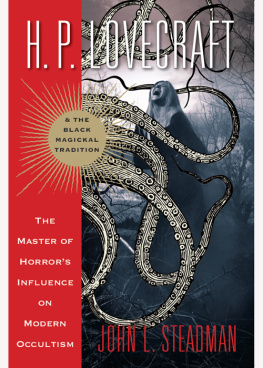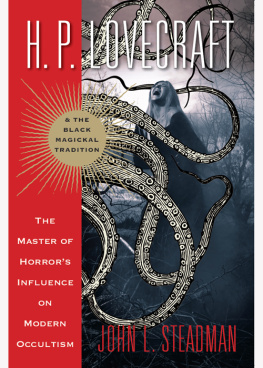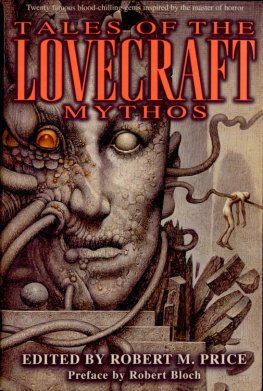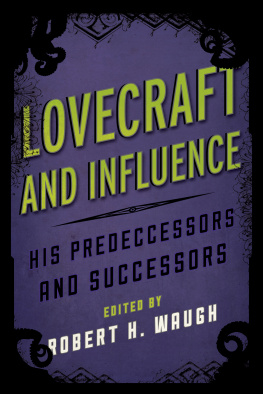A HAUNTED MIND
INSIDE THE DARK, TWISTED WORLD OF H.P. LOVECRAFT
DR. BOB CURRAN
ILLUSTRATED BY IAN DANIELS

Copyright 2012 by Bob Curran
All rights reserved under the Pan-American and International Copyright Conventions. This book may not be reproduced, in whole or in part, in any form or by any means electronic or mechanical, including photocopying, recording, or by any information storage and retrieval system now known or hereafter invented, without written permission from the publisher, The Career Press.
A HAUNTED MIND
EDITED AND TYPESET BY GINA TALUCCI
Cover design by Jeff Piasky
Cover and interior artwork by Ian Daniels
Printed in the U.S.A.
To order this title, please call toll-free 1-800-CAREER-1 (NJ and Canada: 201-848-0310) to order using VISA or MasterCard, or for further information on books from Career Press.

The Career Press, Inc.
220 West Parkway, Unit 12
Pompton Plains, NJ 07444
www.careerpress.com
www.newpagebooks.com
Library of Congress Cataloging-in-Publication Data
Curran, Bob.
A haunted mind : inside the dark, twisted world of H.P. Lovecraft / by Bob Curran ; illustrated by Ian Daniels.
p. cm.
Includes index.
ISBN 978-1-60163-219-7 -- ISBN 978-1-60163-596-9 (ebook)
Lovecraft, H. P. (Howard Phillips), 1890-1937--Criticism and interpretation.
2. Horror tales, American--History and criticism. I. Daniels, Ian. II. Title.
PS3523.O833Z586 2012
813.52--dc23
2012013736
INTRODUCTION
THE DWELLER IN THE SHADOWS

By any stretch of the imagination, Howard Phillips Lovecraft was more than a bit odd. He was not the sort of person you would invite to a dinner party, though its doubtful that he would have come if you had. He was certainly not the life and soul of a gathering, and by all accounts he was not even an easy conversationalist, preferring to confine his exchanges to long, involved, essay-length letters, which he sent to his many correspondents. Yet, he successfully influenced the genre of dark fiction more than any other writer in history. Indeed, his writings, known collectively as the Cthulhu Mythos, have spawned an entire industry with books, films, videos, and role-playing games. They have inspired many other modern writers to develop, extend, and embellish the Mythos by adding their own writings and imaginings to it. His nightmare visions of a fearsome cosmos in which strange and monstrous gods and beings roamed at will, in which the blasphemous books of former years held secrets too terrible to utter, and in which the degenerate inhabitants of remote settlements venerate beings that have long been forgotten by wholesome human civilizations, has captivated the minds of successive generations right up to the present day. So stark and clear was this vision that many have questioned whether it might have some basis in reality: Did the worshipped gods actually exist? Can the nightmarish books be found in some secret or forgotten library? Are the isolated places and their reclusive inhabitants modeled on an actual location? In other words, did Lovecraft (and some of his adherents), actually have access to some form of knowledge that was somehow lost to the rest of the world? And if we did know, would it drive us insane?
But who was H.P. Lovecraft, and from where in his biography might these dark imaginings have come? To some extent, Lovecrafts history was one of privilege, its roots dug deep in old New England aristocracy and gentility, a world away from the squalid and crumbling cabins of the inbred folk in the Rhode Island hills that he sometimes wrote about. It was also, to some extent, a protected upbringing, in which his immediate family shielded the growing boy from the supposed horrors and demands of the rapidly changing world of the early 1900s. Subsequently, this left him strange and withdrawn, and not terribly proficient at making or sustaining face-to-face personal relationships.
He was born at 9 a.m. on August 20th, 1890, at the family home of 194 Angell Street, Providence, Rhode Island. (The house was later renumbered as 454 and then torn down in 1961.) His father, Winfield Scott Lovecraft (18531898), was a commercial traveler for Gorham and Company, silversmiths of Providence. But it was his mother, the neurotic, headstrong, and emotionally unstable Sarah Susan Phillips (18571921) who made the biggest impact on his developmental years. Susie, as she was known, had married beneath her stationshe came from an old Providence family who could trace their origins back to the Colonial founding fathers. Prior to becoming a traveling salesman, Winfield had been a lowly blacksmith during the 1870s and was incapable of giving her the life that she expected as part of the prestigious Phillips family. Winfields father, George Lovecraft (18141895), lived in Mount Vernon, New York, where he had been a harness-maker and accumulated no real fortune that he could pass on to his son. By contrast, Howards maternal grandfather was the wealthy industrialist Whipple Van Buren Phillips, who later on became a surrogate father to Howard.
There may have been a great deal of discord in the Phillips family regarding the marriage. Although generations of the Phillips family had been married in Providence, Susie married Winfield at St. Pauls Episcopal Church in Boston, Massachusetts. In his essay entitled The Parents of Howard Phillips Lovecraft in Epicure of the Terrible (Schultz and Joshi, 1991), Kenneth F. Faig suggests that the wedding may have taken place against the wishes of Susies parents and sisters.
After Howards birth, Susie did not stay long in Providence and returned to Dorchester. Early in 1892, the couple vacationed in Dudley, Massachusetts, with Susies friend, Miss Ella Sweeney. Sweeney later recalled that Susie didnt enjoy the holiday, because she fretted so much about Howard. When he was upstairs, Susie was incredibly agitated downstairs thinking that someone or something would get into the house and molest or injure her infant son. As time passed, she convinced herself that Howard was incredibly delicate, and the slightest exertion might prove grievous.
Later in 1892, the Lovecrafts were forced to give up their rented house in Dorchester and move to a cheaper apartment in the Auburndale suburb of Boston. This move brought them into contact with an eccentric landlady, the poetess Louise Imogen Guiney. Miss Guiney lived in the same house as the Lovecrafts along with her mother, and the two ladies took the young Howard under their wings. Louise had a number of soirees and trained Howard in the memorization of verse, so that he could entertain her guests with long recitals of complicated poetic works. She also instilled in him an abiding love of books and letters, as literary figures came and went through Miss Guineys rooms. (Lovecraft later claimed that he remembered sitting on the knee of Oliver Wendell Holmes.) The attention given to the young boy by such figures gave him an overwhelming air of self-importance, which cut him off from other boys his age in the surrounding area.
This cosseted literary world was about to change, however. In April 1893, in a hotel room in Chicago, Winfield Lovecraft went mad. After attending a sales convention in the city, he retired to his room only to wake in the middle of the night screaming that his wife was being assaulted in the room above. Susie, of course, was in Massachusetts. Winfield was restrained for his own protection and on April 25th, he was committed to the Butler Hospital in Providence.










